In the Middle East, a long tradition of natural healing has been kept alive. The ancient Arabic culture values olive oil, psyllium husk, black seeds, and honey. Together, they form a powerful mix that helps with many health issues.
These natural remedies come from a rich history and traditional wellness practices. They offer a complete way to stay healthy.
Key Takeaways
- The Arabic healing tradition combines the use of olive oil, psyllium husk, black seeds, and honey for their numerous health benefits.
- These natural ingredients have been used for centuries in Middle Eastern cultures and hold deep cultural significance.
- The blend of these remedies offers a synergistic effect, providing a holistic approach to wellness.
- The traditional preparation and application of these natural remedies have evolved over time, but their core benefits remain.
- The integration of these Arabic natural remedies into daily life can provide a range of health advantages.
Understanding the Ancient Arabic Healing Tradition
The roots of Middle Eastern natural medicine go back centuries. They are deeply rooted in Arab cultures. These ancient healing practices use natural ingredients to treat many ailments.
Origins of Middle Eastern Natural Medicine
The history of Arabic traditional medicine starts with the region’s geography and herbal knowledge. Arab healers used plants like olive oil, black seeds, and honey to heal. These natural remedies are still used today.
Cultural Significance in Arab Wellness Practices
In Middle Eastern culture, traditional healing is very important. It’s tied to spiritual and religious beliefs. These natural remedies are seen as part of a complete approach to health, covering physical, mental, and emotional well-being.
Historical Evolution of Traditional Remedies
Over time, Arabic traditional medicine has grown and changed. Ancient texts have passed down knowledge of these remedies. They have stood the test of time and are still valued today.
“Natural remedies have been an integral part of Middle Eastern culture for centuries, serving as a bridge between the physical and spiritual realms of wellness.”
Why Arabs Use Olive Oil with Psyllium Husk, Black Seeds and Honey
In Arab health traditions, a special mix of olive oil, psyllium husk, black seeds, and honey is highly valued. This mix is known for its health benefits and is used to improve overall well-being. Let’s explore why this practice is so important.
Olive oil, known as “liquid gold,” is a key part of Arab cuisine and medicine. It’s full of healthy fats and has anti-inflammatory properties. Psyllium husk, a fiber, helps with digestion and bowel health, which is crucial in the region.
Black seeds, or Nigella sativa, are known for their health benefits. They have anti-inflammatory, antimicrobial, and immune-boosting qualities. This makes them a great addition to the mix.
Natural honey is also highly valued in Arab culture for its health benefits. It has antibacterial, antioxidant, and wound-healing properties. This makes it a versatile part of the remedy.
Together, these ingredients help with many health issues, like digestion, breathing, and skin problems. Each one adds something special to the mix, making it a trusted solution in Arab health traditions.
| Ingredient | Benefits |
|---|---|
| Olive Oil | Anti-inflammatory, healthy fats |
| Psyllium Husk | Regulates bowel movements, improves digestive health |
| Black Seeds | Anti-inflammatory, antimicrobial, immune-boosting |
| Honey | Antibacterial, antioxidant, wound-healing |
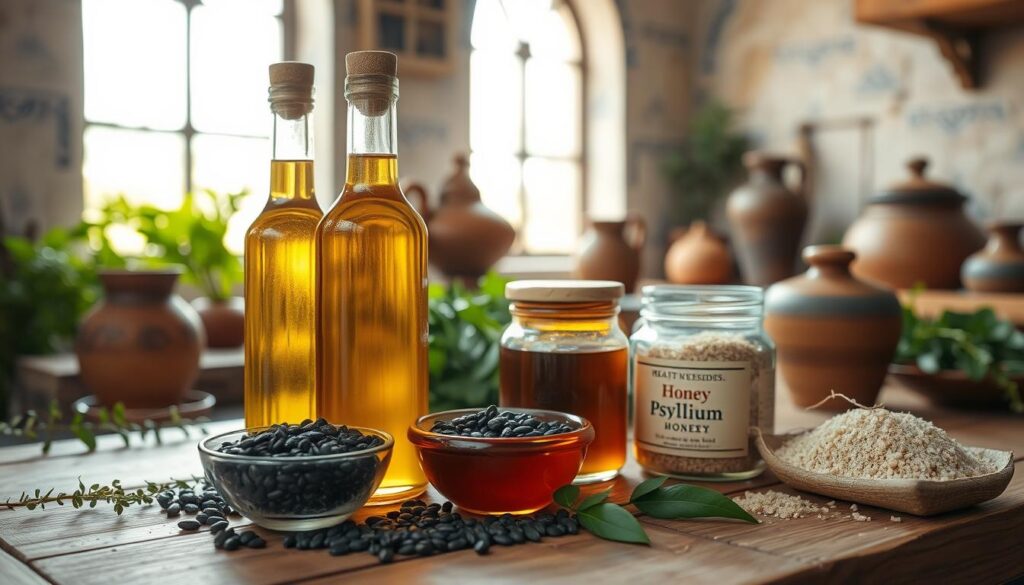
The history and cultural importance of this remedy show the Arab world’s deep connection with nature’s healing power. By understanding how these ingredients work together, we can learn more about the holistic approach to health in Arab communities.
The Sacred Trilogy: Olive Oil, Black Seeds, and Natural Honey
In Arab natural medicine, olive oil, black seeds, and natural honey stand out. They have been valued for centuries. Each one brings special benefits that work together for overall health.
Synergistic Effects of Combined Ingredients
Olive oil, black seeds, and honey together make a powerful mix. Olive oil’s anti-inflammatory and antioxidant effects team up with black seeds’ antimicrobial and immune-enhancing properties. Natural honey’s wound-healing and digestive-soothing qualities complete the trio’s health benefits.
Traditional Preparation Methods
For generations, Arab traditions have kept the best ways to use these ingredients. They include:
- Cold-pressing organic olives for pure olive oil
- Drying and grinding black seeds into a fine powder
- Getting raw, unprocessed honey from local bees
- Mixing or infusing the three in special ways
Optimal Usage Guidelines
Health experts say to use this sacred mix every day. Here’s how:
- Take a spoonful of the olive oil, black seed, and honey mix daily
- Use it on your skin for health and healing
- Add it to Arab dishes and drinks
By using Arab natural medicine, you can start a journey to better health. This sacred trio can change your life for the better.
Olive Oil: The Liquid Gold of Mediterranean Culture
In the Mediterranean, olive oil is seen as a sacred elixir, a “liquid gold” that nourishes body and soul. This ancient nectar, rooted in Arab and Mediterranean traditions, offers many health benefits. It has captured the world’s attention.
Olive oil is central to the Mediterranean diet. It’s more than a food; it’s a way of life. It symbolizes wellness and shows the region’s deep connection with nature. Olive oil is rich in anti-inflammatory properties, helping to keep us well and protect against chronic diseases.
Olive trees are grown in many Mediterranean places, like Tuscany and Crete. The hard work of harvesting and pressing these fruits shows the region’s respect for the land. This labor is a key part of their culture.
“Olive oil is not just a food, but a lifestyle – a way of being that connects us to the rhythms of the earth and the wisdom of our ancestors.”
Olive oil can take you to the Mediterranean’s sun-dappled orchards. It’s used in many ways, from salads to stews. Its health benefits and versatility make it a key part of the Mediterranean’s food and wellness traditions. It’s a timeless elixir that nourishes people all over the world.
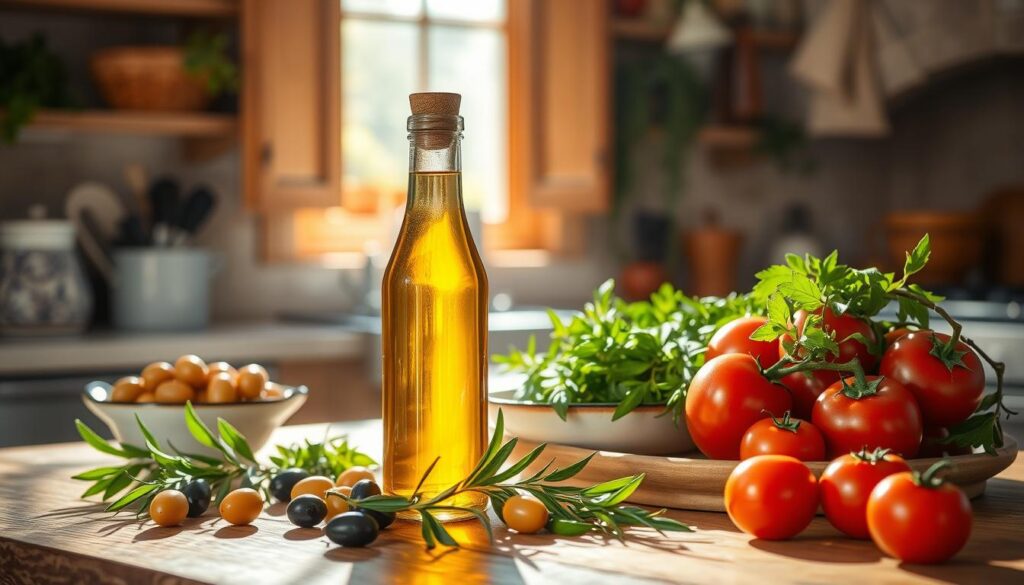
Black Seeds (Nigella Sativa): Nature’s Miracle Cure
In ancient Arabic healing, black seeds, or Nigella Sativa, were highly valued. These small seeds are packed with health benefits. They are a key part of traditional Arab medicine.
Anti-inflammatory Properties
Black seeds are known for their strong anti-inflammatory effects. Nigella Sativa contains thymoquinone, which fights inflammation in the body. This makes them great for treating joint pain and respiratory problems.
Immune System Benefits
Black seeds also boost the immune system. Research shows they help immune cells work better. This helps the body fight off infections and illnesses. As an immune system booster, they’re a favorite in Arab communities.
Traditional Applications
- In traditional Arab medicine, Nigella Sativa treats many conditions, from breathing problems to stomach issues.
- The seeds are ground into powder and mixed with honey or oil. This creates strong remedies.
- Black seed oil is also used on the skin for its anti-inflammatory benefits.
The effectiveness of Nigella Sativa has made it “nature’s miracle cure” in the Arab world. Modern science is confirming the black cumin benefits. This ancient remedy is now recognized for its health benefits.
Natural Honey in Arab Medicine: More Than Just a Sweetener
In Arab traditional medicine, honey is more than a sweetener. It’s valued for its strong antioxidants and healing powers. This golden liquid has been a key part of health practices for centuries.
Honey’s healing abilities come from its special mix of compounds. Antioxidants in honey help fight stress, reduce swelling, and boost the immune system. Manuka honey, known for its antibacterial and healing properties, is especially popular in Arab medicine.
| Honey Variety | Key Benefits |
|---|---|
| Manuka Honey | Antimicrobial, Wound Healing, Skin Care |
| Raw Honey | Antioxidant, Anti-inflammatory, Digestive Support |
| Wildflower Honey | Immune System Boost, Respiratory Support |
Arab healers have always seen honey as a powerful tool against many diseases. They use honey’s special compounds to create remedies. These remedies are still studied today, showing the wisdom of Arab medicine.
“Honey is a healing for mankind.” – Quran, Surah an-Nahl, Verse 69
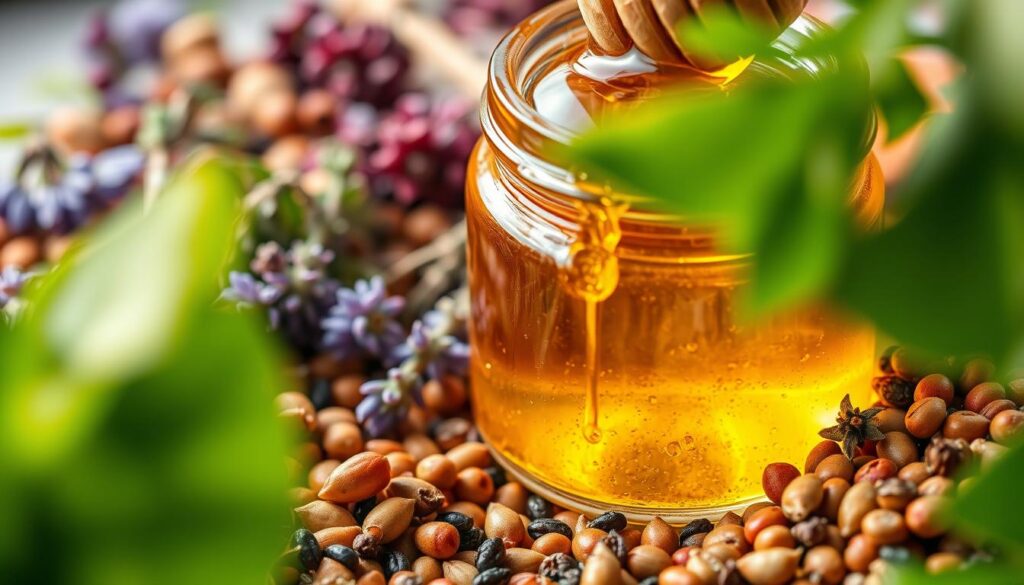
The Arab world still values honey as a natural healer. From ancient times to now, honey has been a key part of the region’s health traditions.
Psyllium Husk: The Ancient Fiber Supplement
In the rich history of Arab medicine, psyllium husk is a key natural fiber. It’s known for its digestive health benefits. This ancient remedy is now getting attention again for its role in gut health.
Digestive Health Benefits
Psyllium husk comes from the Plantago plant seeds. It’s a rich source of dietary fiber from psyllium. This fiber absorbs water, forming a gel that helps with bowel movements and gut health.
Using psyllium husk fiber regularly can help with constipation, diarrhea, and other gut problems. It’s a great way to keep your digestive system balanced and comfortable.
Modern Scientific Validation
Modern research has backed up psyllium husk’s traditional use in Arab medicine. Studies show it helps with irritable bowel syndrome (IBS), lowers colon cancer risk, and reduces cholesterol. These findings prove psyllium’s value as a natural, safe, and effective gut health supplement.
| Benefit | Research Findings |
|---|---|
| Constipation Relief | A study in the American Journal of Gastroenterology found psyllium husk better than placebo for bowel function and constipation relief. |
| Cholesterol Reduction | Studies show psyllium husk lowers LDL (bad) cholesterol, which can reduce heart disease risk. |
| IBS Symptom Management | Research in the Journal of the American College of Nutrition found psyllium husk helps with IBS symptoms like abdominal pain, bloating, and diarrhea. |
The scientific community is still discovering psyllium husk’s potential. Its role in gut health and overall wellbeing is well-established in both traditional Arab medicine and modern holistic healthcare.
Prophetic Medicine and Natural Remedies
In the rich tapestry of Arab wellness traditions, Prophetic Medicine holds a revered place. It is rooted in the teachings and practices of the Prophet Muhammad. This holistic approach to health is deeply connected with islamic herbal cures and ancient arabic medicine.
The Prophet’s emphasis on natural remedies is well-documented in the hadith. The hadith records the Prophet’s sayings and actions. He endorsed and used natural wonders like honey and black seeds for their healing powers.
This prophetic medicine tradition has lasted for centuries. It has shaped arab wellness practices today. Modern Arab communities still follow the Prophet’s teachings, using these natural remedies in their daily lives.
The use of ingredients like olive oil, psyllium husk, and honey shows the wisdom of ancient arabic medicine. These natural remedies address health concerns and hold cultural significance. They reflect the Arabs’ reverence for the holistic well-being of body, mind, and spirit.
“Honey is a remedy for every illness, and the Quran is a remedy for all illness of the mind, therefore I recommend to you both remedies, the Quran and honey.”
– Prophet Muhammad (peace be upon him)
As modern science confirms the effectiveness of these islamic herbal cures, Prophetic Medicine remains key to Arab wellness. It connects the ancient with the contemporary.
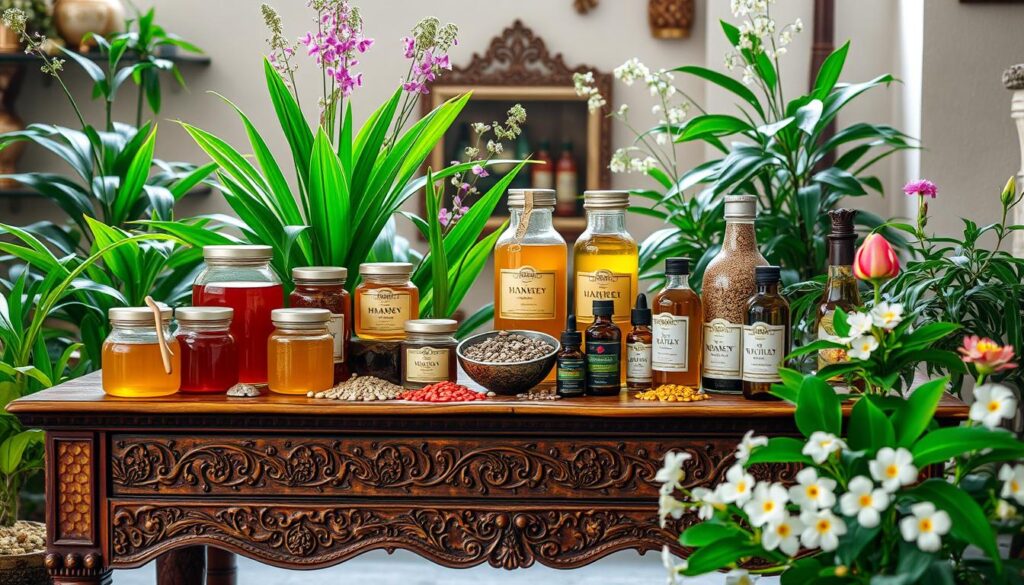
Modern Science Meets Traditional Arabic Medicine
In the world of alternative therapies and holistic wellness, Arabic medicine is getting more attention. Scientists are looking into the old practices to see if they work. They want to prove their effectiveness through careful studies and research.
Clinical Studies and Research
Many studies have looked into the health benefits of Arabic remedies. Researchers have found out what makes these natural treatments work. They’ve discovered how black seeds fight inflammation and how psyllium husk helps digestion.
Validated Health Benefits
- Olive oil is full of antioxidants and can help your heart and brain.
- Black seeds (Nigella sativa) might help with asthma, diabetes, and some cancers.
- Natural honey is good for fighting germs, healing wounds, and boosting your immune system.
- Psyllium husk, rich in fiber, can improve digestion and help with weight.
As scientists learn more about Arabic medicine, it’s becoming part of modern healthcare. The proof of its benefits shows that alternative therapies are important for overall wellness.

“The marriage of traditional Arabic medicine and modern scientific validation holds immense promise for the future of healthcare, bridging the gap between ancient wisdom and cutting-edge research.”
Incorporating Arab Natural Remedies into Daily Life
Discover the world of Arab natural remedies and how to add them to your daily routine. These ancient ingredients are powerful dietary supplements and superfood boosters. They support your health and well-being.
Olive oil, black seeds, and natural honey are key in Arab healing traditions. Learning about their benefits can improve your physical and mental health.
- Begin your day with raw, unprocessed honey. It boosts your immune system and gives you natural energy.
- Add black seeds (Nigella sativa) to your morning smoothie, baked goods, or salads. They are known for their anti-inflammatory and immune-supporting properties.
- Use high-quality olive oil on your meals, for cooking, or mix it with honey for a daily tonic. Its healthy fats and antioxidants are beneficial.
By adding these dietary supplements to your daily routine, you can enjoy many health benefits. They improve digestion, boost immunity, and enhance overall well-being.
| Ingredient | Health Benefits | Traditional Uses |
|---|---|---|
| Olive Oil | Anti-inflammatory, heart-healthy fats, antioxidants | Cooking, topical applications, natural tonic |
| Black Seeds (Nigella Sativa) | Anti-inflammatory, immune-boosting, digestive support | Culinary spice, herbal remedy, topical applications |
| Natural Honey | Antimicrobial, antioxidant, energy-boosting | Sweetener, wound healing, natural cough remedy |
Embrace the wisdom of Arab natural healing. Let these superfood boosters enrich your life. Discover their transformative power and add them to your wellness routine.
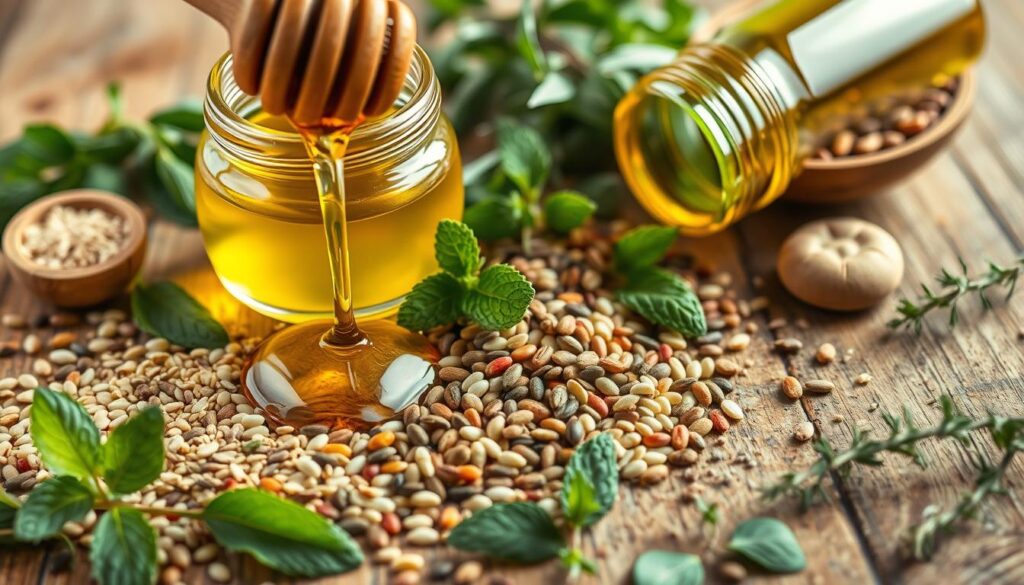
Common Ailments Treated with Traditional Arab Remedies
Traditional Arab medicine is rich and diverse. It uses natural remedies for many health issues. These treatments are known for their holistic approach, blending ancient wisdom with modern science.
Digestive Issues
Traditional Arab remedies excel in treating digestive problems. Olive oil, psyllium husk, and black seeds are used together. They help with constipation, bloating, and other stomach issues.
These ingredients work together to improve digestion. They support regular bowel movements and overall gut health.
Respiratory Conditions
The Arab world values natural remedies for breathing problems. Honey is a key ingredient, known for its healing properties. It soothes sore throats and eases coughs.
Black seeds add to honey’s benefits, reducing inflammation. Together, they offer a gentle yet effective way to improve breathing.
Skin Problems
Traditional Arab remedies also help with skin issues. Olive oil is a key ingredient, known for its moisturizing properties. It fights dryness, eczema, and acne.
Honey is another popular remedy, thanks to its antimicrobial and healing properties. It’s used for skin infections and wounds.
Traditional Arab medicine offers a holistic way to tackle common health issues. It uses natural laxatives, herbal supplements, and proven remedies. These help with digestion, breathing, and skin health.
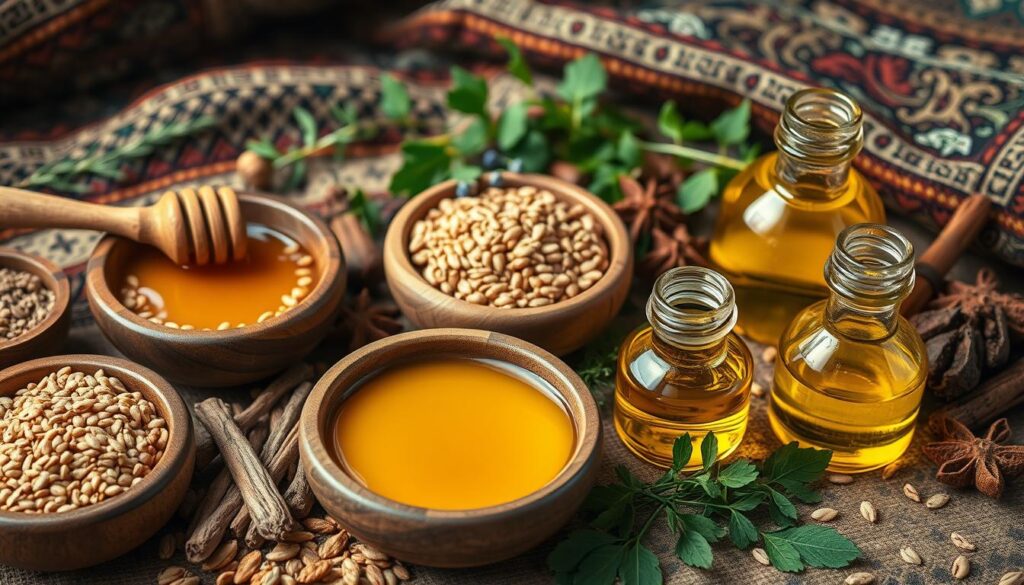
The Role of Natural Remedies in Arab Culinary Traditions
In the vibrant world of Arab cooking, natural remedies are key. They mix health with flavor. From the Levant to the Gulf, ingredients like olive oil, black seeds, honey, and psyllium husk are central to arab cuisine.
Olive oil, known as “liquid gold,” is a mainstay in Arab dishes. It adds flavor and health benefits to stews and pastries. Black seeds, or Nigella sativa, boost the nutritional value, offering anti-inflammatory and immune support.
Natural honey is also crucial in Arab cooking. It’s used on falafel and in desserts. Honey’s sweetness and health benefits make it a favorite in arab cuisine.
Psyllium husk, rich in fiber, is used in Arab recipes. It adds texture and improves digestion. These natural remedies, used together, create dishes that are both tasty and healthy.
| Natural Remedy | Culinary Applications | Health Benefits |
|---|---|---|
| Olive Oil | Stews, pastries, dressings | Heart health, anti-inflammatory |
| Black Seeds | Breads, rice dishes, marinades | Immune system support, digestive health |
| Honey | Desserts, dips, glazes | Antimicrobial, antioxidant properties |
| Psyllium Husk | Baked goods, drinks, supplements | Improved digestion, weight management |
The use of natural remedies in Arab cooking shows a deep understanding of food and health. As the world looks for holistic food options, Arab cooking’s wisdom is guiding global food trends.
Safety Considerations and Usage Guidelines
Using Arab natural remedies in your wellness routine is important. You need to know the right way to use them and how to stay safe. These traditional treatments are usually safe but can affect certain medicines or need specific amounts. Here are some key points for a safe and effective use.
Dosage Recommendations
Traditional Arab remedies have specific dosages based on long use. For example, Nigella sativa (black seeds) should be taken in 1-2 teaspoons a day. Psyllium husk needs to be taken with lots of water. Always follow the traditional dosages to get the best results without harm.
Potential Interactions
Some natural remedies might not work well with certain medicines or health issues. For instance, olive oil and honey could affect blood-thinning drugs. Always talk to a doctor, especially if you’re on prescription drugs, to make sure your natural remedies are safe and work well.
Precautions for Specific Conditions
- Pregnant or nursing women should talk to their doctor before trying Arab natural remedies. Some ingredients might not be safe during pregnancy or while breastfeeding.
- People with diabetes should be careful with honey because it can change blood sugar levels.
- Psyllium husk might not be good for everyone, especially those with stomach problems. Use it with caution.
By following the right usage guidelines and being careful, you can safely use Arab natural remedies. They can help improve your overall health. A mix of traditional wisdom and modern medicine can lead to a healthier life.
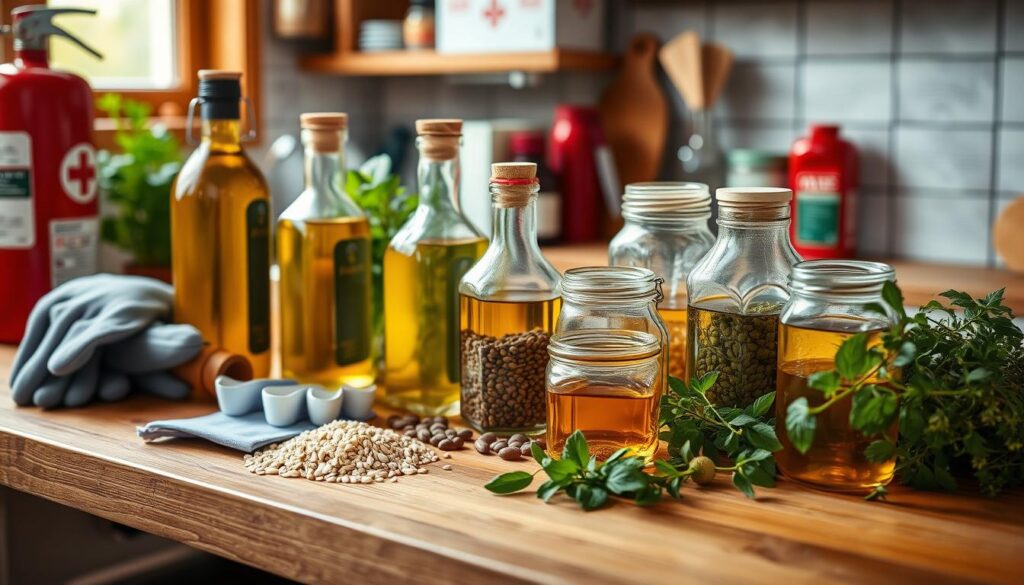
Conclusion
The ancient wisdom of Arab natural medicine has lasted for centuries. It comes from the rich culinary heritage of the Middle East. The trio of olive oil, black seeds, and natural honey is a powerful mix for health.
These remedies help with digestion, breathing, and skin care. They are still loved today for their natural healing powers.
Exploring Arab wellness shows how nature and health are connected. Using these Middle Eastern remedies in our lives feeds our bodies. It also connects us to old traditions that have helped communities for ages.
In a world that often turns to man-made fixes, ancient wisdom stands out. By using Arab natural remedies, we can find true healing. We can improve our health, a little at a time, with honey, olive oil, and black seeds.
Thanks a lot for sharing this with all of us you actually know what you are talking about! Bookmarked. Kindly also visit my site =). We could have a link exchange agreement between us!
Thank you!